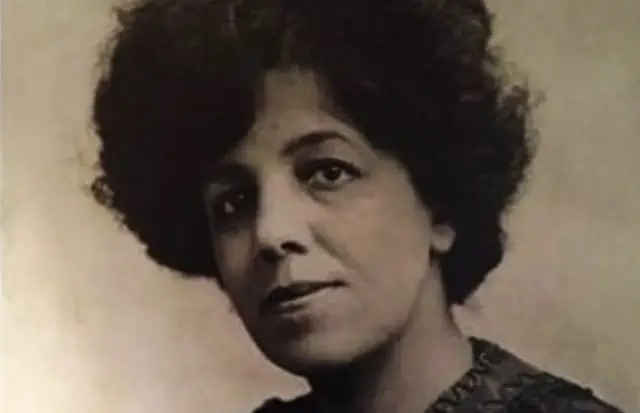Who is JRD Tata and what is his legacy?
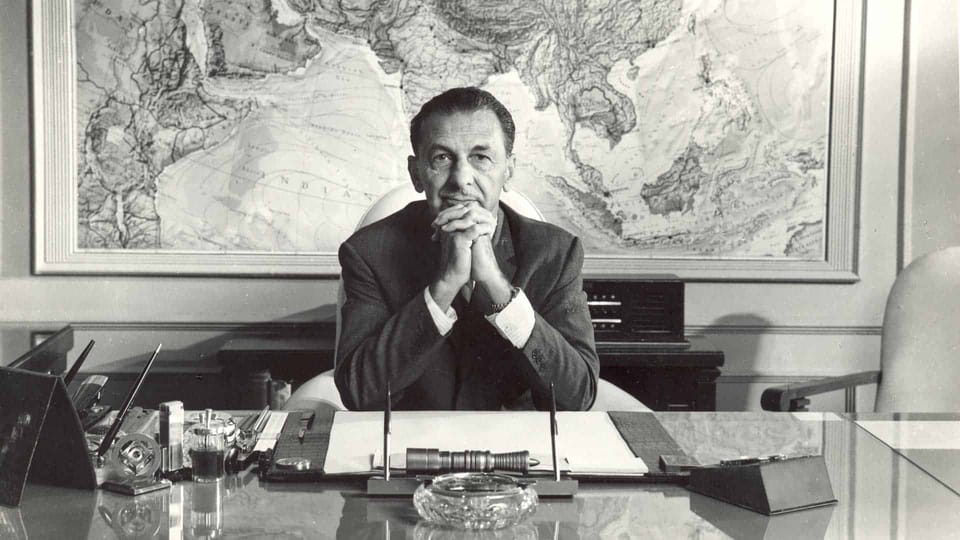
We delve into the life and legacy of a truly remarkable figure - Jehangir Ratanji Dadabhoy Tata, more commonly known as JRD Tata. As a pioneering force in Indian aviation and an influential business leader, JRD Tata's impact on India's corporate and philanthropic landscape is immense. In this post, we'll explore his journey, from obtaining India's first commercial pilot license to leading the Tata Group to astonishing heights, and discuss the institutions and initiatives he established that continue to shape India's progress. Join us as we uncover the inspiring story of JRD Tata and the lasting legacy he has left behind.
A Tribute
JRD Tata, the founder of many Tata companies and a hero of Indian business, has been paid tribute on his birth anniversary by Tata Steel, which organized a host of activities like sports, quizzes, and plantation drives. JRD Tata was awarded the Bharat Ratna, the Republic of India's highest civilian honor, and became India's first licensed pilot.
He was the founder of Tata Memorial Hospital, Tata Tea, Titan, Tata Airlines (now known as Air India), Voltas, Tata Consultancy Services, Tata Motors, Tata Chemicals, Tata Institute of Social Sciences, and the National Centre for the Performing Arts. JRD Tata's philanthropic activities have left a lasting impact on India, and the Tata Group is known for its charity, trust, and good ethics.
The legacy
Jehangir Ratanji Dadabhoy Tata, or JRD Tata, was a trailblazer in Indian aviation and an influential business leader, known for his extensive philanthropic contributions. Born in Paris in 1904, JRD Tata was the first individual to earn a commercial pilot license in India. He played a crucial role in establishing Tata Airlines, which eventually became Air India, and under his guidance, the Tata Group's worth expanded from $100 million to more than $5 billion. JRD Tata served as the chairman of Tata Sons from 1938 until 1988 and received the prestigious Bharat Ratna, India's highest civilian award, in 1992.
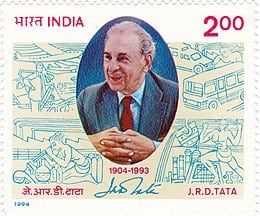
In addition to being a prosperous entrepreneur, JRD Tata was a generous benefactor who established numerous organizations in India. Among these are the Tata Memorial Hospital, Tata Tea, Titan, Voltas, Tata Consultancy Services, Tata Motors, Tata Chemicals, Tata Institute of Social Sciences, and the National Centre for the Performing Arts. He also set the groundwork for various research and educational institutions across the country. JRD Tata revolutionized personnel management and implemented diverse welfare programs to motivate his employees. Today, the Tata Group is seen as an emblem of generosity, integrity, and strong ethical values throughout India.

JRD Tata was also known for his philanthropic activities and modernizing personnel management. He established many research and educational institutes in India and donated all of his wealth to set up the Sir Dorabji Tata Trust and the Lady Tata Memorial Trust. He was awarded the Bharat Ratna, the Republic of India's highest civilian honor, and became India's first licensed pilot. JRD Tata passed away in Geneva, Switzerland, on November 29, 1993.
The Journey
In 1868, Jamsetji Nusserwanji Tata established the Tata Group, which began as a private trading firm and has since evolved into one of India's most prominent private-sector corporations. Despite the Indian economy and worldwide economic challenges, the Tata Group has flourished as an international Indian conglomerate, with interests spanning industries such as aviation, steel, power, chemicals, and information technology.
Tata Sons functions as the main investment holding company and promoter for Tata companies, maintaining the majority of shareholding in the Tata group of companies. This encompasses their land holdings throughout India, tea estates, and steel plants. Philanthropic trusts hold 66% of Tata Sons' equity share capital, contributing to education, health, livelihood generation, and arts and culture.
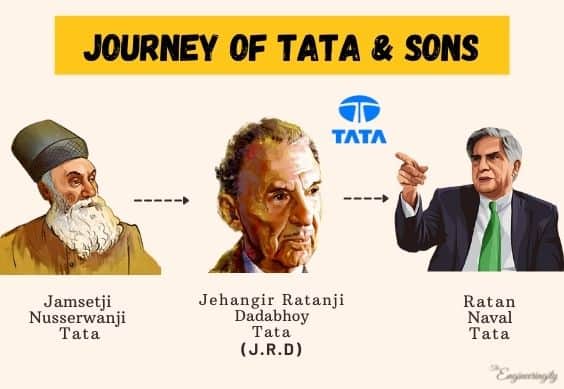
Operating on six continents, the Tata Group provides products and services to over 150 countries and has a presence in 100 countries worldwide. In the fiscal year 2021-22, the group's annual revenue was reported at $128 billion, and as of March 2022, the combined market capitalization for the 29 publicly-listed Tata Group companies reached $311 billion. The company's operations extend throughout Asia, Africa, America, and the Middle East.
Notable Achievements
JRD Tata was a forward-thinking business magnate and entrepreneur who played a major role in India's industrial development. He founded numerous companies, such as Tata Tea, Titan, Tata Airlines (now Air India), Voltas, Tata Consultancy Services, Tata Motors, Tata Chemicals, Tata Institute of Social Sciences, and the National Centre for the Performing Arts. Additionally, he established the groundwork for numerous research and educational facilities in India. Under his guidance, the Tata group's assets swelled from $100 million to over $5 billion, extending into industries like chemicals, automobiles, tea, and information technology.
JRD Tata made history as the first individual in India to receive a commercial pilot license, subsequently launching Tata Airlines, which later evolved into Air India International. A lover of the arts, he led the Tatas to become India's premier art purchasers, promoters, and supporters. As a philanthropist, he founded several charitable organizations, including the Tata Memorial Hospital, a leading cancer research center in India.
JRD Tata was celebrated for his forward-thinking initiatives, such as modernizing personnel management, which significantly influenced the company's strategic course. He motivated his employees by implementing various welfare programs to inspire those who were less engaged. Known for his thoughtful and polite demeanor, he penned over 40,000 letters throughout his life, ensuring every inquiry and correspondence, no matter how trivial, received a response.
JRD Tata's remarkable accomplishments encompass his contributions to Indian industry, his leadership of the Tata group, his founding of charitable organizations, his support for the arts, and his trailblazing involvement in Indian aviation.
Aviation Industry
JRD Tata held a profound fascination for the world of aviation. Born in Paris in 1904, JRD's interest in flying was sparked during his early years, inspired by the rapid advancements in aviation during World War I and the accomplishments of pioneering aviators like Louis Blériot and Charles Lindbergh.
JRD Tata's enthusiasm for aviation only grew stronger, leading him to become the first Indian to receive a commercial pilot's license in 1929. This marked not only a personal milestone for JRD but also a significant moment in India's aviation history. Driven by his passion for flight, JRD went on to establish Tata Airlines in 1932. Initially, the airline operated as a mail service between Karachi and Bombay (now Mumbai), expanding to Madras (now Chennai) in 1933.
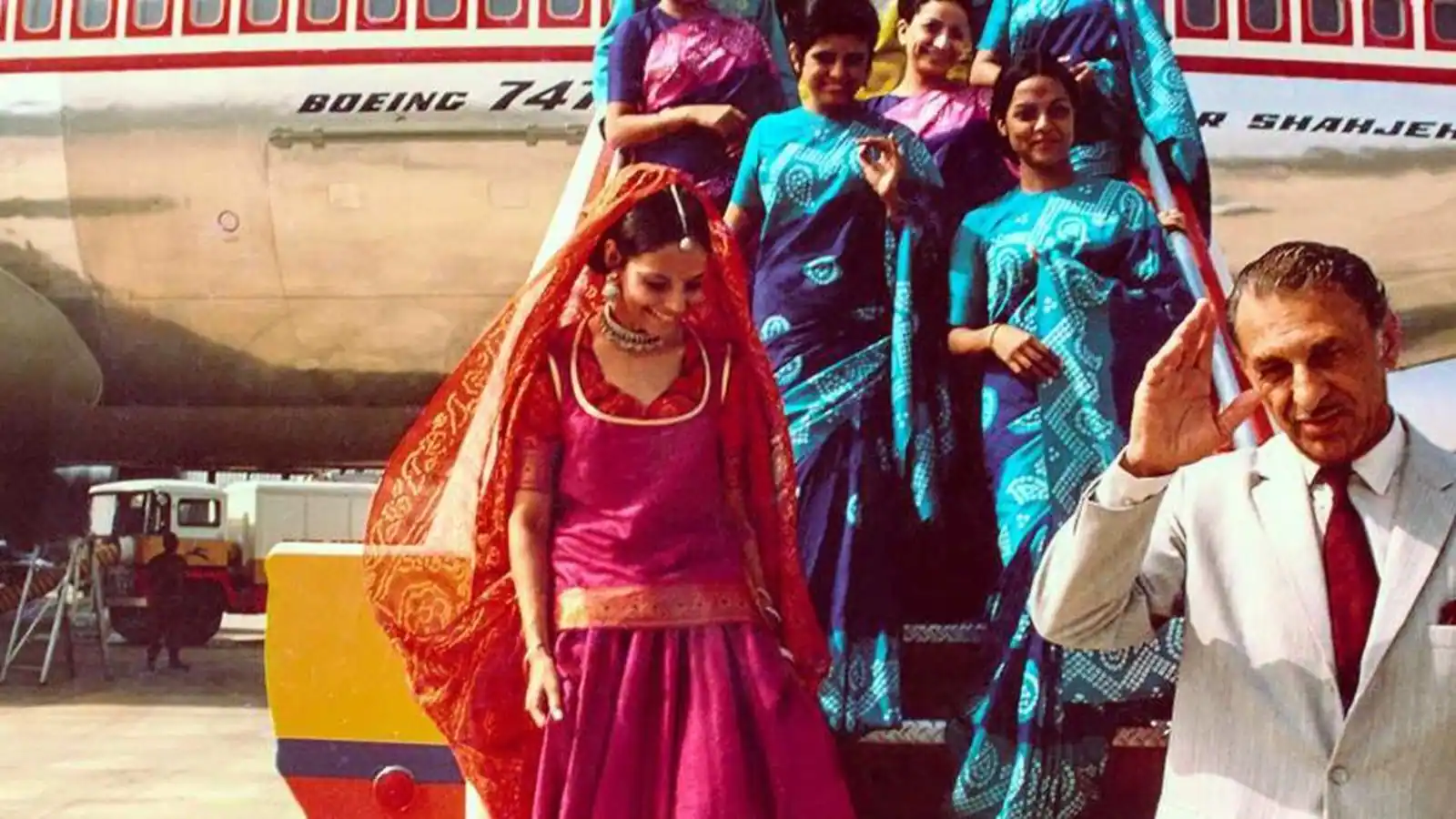
Over time, Tata Airlines broadened its services and transitioned into a public limited company, adopting the name Air India in 1946. In 1953, Air India was nationalized, with JRD Tata continuing to serve as its chairman until 1977. He was reappointed to the position in 1986, remaining in the role until his retirement in 1988. Under JRD Tata's guidance, Air India became a symbol of national pride and earned a reputation as one of the world's most esteemed airlines.
JRD Tata's unwavering passion for aviation not only shaped India's aviation industry but also left an indelible mark on the global stage. His vision, commitment, and leadership laid the groundwork for a prosperous aviation sector in India, which continues to thrive and expand today.
How did JRD Tata contribute to philanthropic activities in India?
JRD Tata was known for his philanthropic activities in India. He established many research and educational institutes in India, including the Tata Institute of Social Sciences, the National Centre for the Performing Arts, and the Tata Memorial Hospital.
In addition, JRD Tata was the first Indian businessman to introduce a provident fund, medical services, maternity benefits, gratuities, accident insurance schemes, and the eight-hour shift.
He was also known for his voluntary reforms, which the Indian government later emulated. JRD Tata was a patron of the arts, and under his leadership, the Tatas became the biggest buyers, promoters, and supporters of the art world in India.
He was also associated with many philanthropic institutions, including the Sir Ratan Tata Trust, the Navajbai Ratan Tata Trust, the Sir Dorabji Tata Trust, the JN Endowment for the Higher Education of Indians, and the JRD and Thelma J Tata Trust.
The JRD Tata Trust offers institutional grants focusing on overall developmental issues and gives scholarships for studies in India.
How has JRD Tata's legacy impacted India?
JRD Tata's legacy has had a significant impact on India. He played an important role in shaping up the country's industries through his contribution to industrial planning and policy framing. His ideas helped the country crawl out of a tight spot and even formed the backbone of all the industries that emerged post-Independence.
JRD Tata's philanthropic activities have also left a lasting impact on India. He founded many research and educational institutes, including the Tata Institute of Social Sciences, and established hospitals such as the Tata Memorial Hospital.
The Tata Group is known for its charity, trust, and good ethics, and JRD Tata's legacy has contributed to this reputation. Under his leadership, the assets of the Tata Group grew from $100 million to over $5 billion, and the group became a conglomerate of 95 enterprises.
The Taj Mahal Palace Hotel
The Taj Mahal Palace Hotel is a heritage, five-star, luxury hotel in the Colaba area of Mumbai, Maharashtra, India, situated next to the Gateway of India. It was built in 1903 and is India's first luxury hotel. The hotel is a city landmark and offers panoramic views of the Arabian Sea and the Gateway of India. The Taj Mahal Palace Hotel was commissioned by Jamsetji Tata and opened its doors to guests on 16 December 1903.
The hotel has a long and distinguished history, having received many notable guests, from presidents to captains of industry and show business stars. The Taj Mahal Palace Hotel is owned by the Tata Group, which is India's largest conglomerate. The Tata Group has a complex legacy with the Britishers, as it was founded during the British Raj and has a history of working with the Britishers.
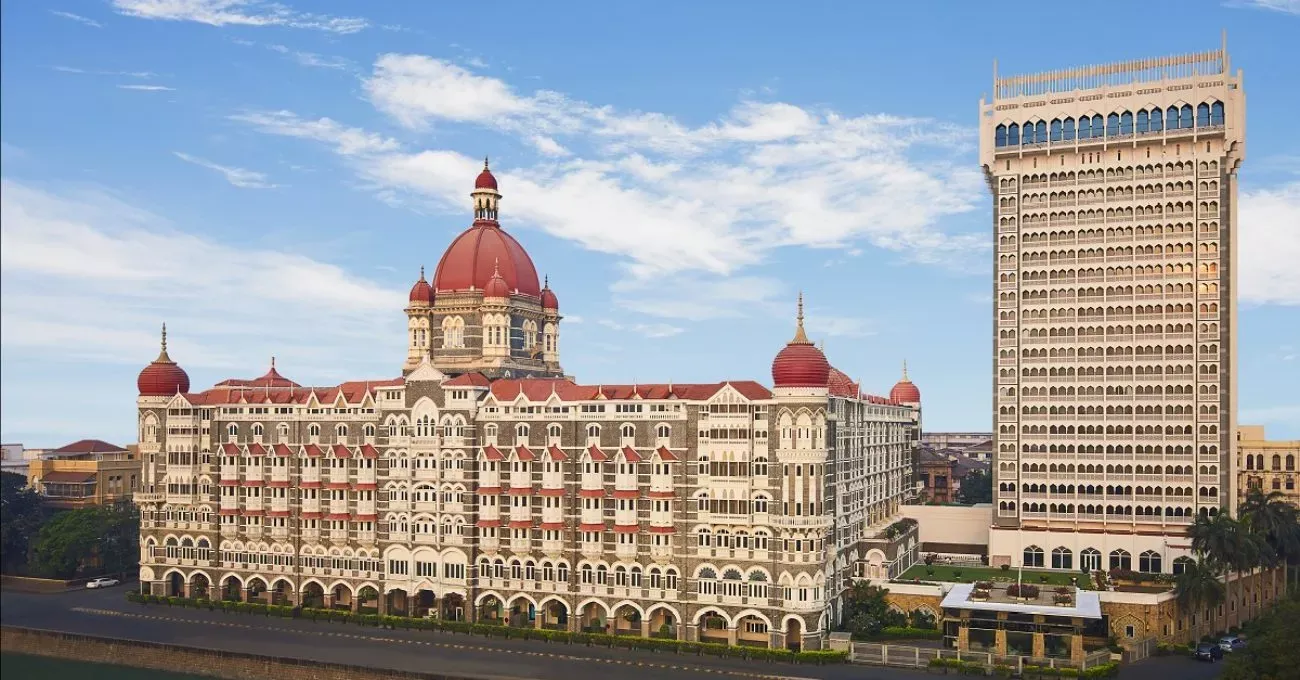
However, the Tata Group has also been involved in India's independence movement and has contributed significantly to the country's development. The Taj Mahal Palace Hotel is one of the many businesses owned by the Tata Group, and it is known for its luxurious accommodations, 10 restaurants, and Jiva Spa, which offers a variety of traditional Indian therapies.
Back Story
Legend has it that Jamsetji Tata, the mastermind behind the Tata Group, was barred from entering Mumbai's upscale Watson Hotel due to his non-European heritage. Consequently, Tata set out to create a hotel that would appeal to Europeans, Indians, and individuals from all backgrounds, epitomizing Mumbai's grandeur.
However, author Charles Allen has cast doubt on this tale, asserting that Tata likely wouldn't be so perturbed by the snub to warrant constructing a new hotel. Instead, Allen posits that the Taj Mahal Palace Hotel was born out of the Times of India editor's desire for a "hotel befitting Bombay" and as a heartfelt tribute to the city from Tata himself.
Charles Allen didn't offer any convincing justification for his assertion that Jamsetji Tata's denial of admittance into the Watson Hotel was a myth. Allen might have based his assertion on his own investigation and evaluation of the relevant historical records. It's also possible that his assertion is just his personal opinion or interpretation of what happened.
Charles Allen, a British freelance writer and historian, challenged the claim that Jamsetji Tata was turned away from the Watson Hotel. Allen was born in Kanpur, India, where six generations of his family served under the British Raj. Despite being British, his parents were both born in India. Allen, a traveler and historian who spent a significant portion of his adult life in India, wrote a number of books with the British Raj at their center.
Welcoming guests since December 16, 1903, the iconic Taj Mahal Palace Hotel is now a beloved landmark in the city. Owned by the Tata Group, India's preeminent conglomerate, the hotel is renowned for its lavish lodgings, 10 enticing eateries, and the Jiva Spa, which features an array of traditional Indian treatments.
True Gem
JRD Tata was a forward-thinking pioneer in Indian aviation. He laid the groundwork for civil aviation in India and held the conviction that the nation and its citizens should reap the advantages enjoyed by the rest of the world. JRD wasn't merely a trailblazing entrepreneur, but also India's first licensed pilot.
Under his guidance, the Tata Group flourished into a 95-enterprise conglomerate, with aviation playing a significant role in the company's expansion.
The successor to JRD Tata's legacy, Ratan Tata, is another visionary leader who has propelled the Tata Group to new heights.
Ratan Tata is recognized for his philanthropic endeavors, having established numerous research and educational institutions, hospitals, and charitable trusts. He has also driven the Tata Group to broaden its global footprint and has played a key role in the group's strategic partnerships with AirAsia Berhad and Singapore Airlines, for AirAsia India and Vistara, respectively.
Today, the Tata Group stands as India's largest conglomerate, offering products and services in over 150 countries and operating in 100 countries across six continents.



